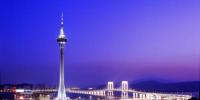 Macau may not see the success of non-gaming ventures for decades according to a number of commentators familiar with the region. Recently, those in Beijing and Macau have been urging casino operators to look at diversification for some time now. Without the infrastructure in place, it’s difficult for the firms to succeed and it means that non-gaming revenue is at it’s highest at 16% for Sands China.
Macau may not see the success of non-gaming ventures for decades according to a number of commentators familiar with the region. Recently, those in Beijing and Macau have been urging casino operators to look at diversification for some time now. Without the infrastructure in place, it’s difficult for the firms to succeed and it means that non-gaming revenue is at it’s highest at 16% for Sands China.
“Macau is expected to transform from a largely casino gaming city to a more family and business travel destination,” University of Macau associate professor of business economics Ricardo Siu told the Asia Times.
“To achieve this end, nevertheless, is not a one- to two-year project,” Siu said. “For example, related infrastructure, such as the Hong Kong-Zhuhai-Macau bridge, the light monorail in Macau, the transportation system which supports the construction of a one-hour living area in the Pearl River Delta, and other elements, must be completed in the coming decade before Macau could really diversify its existing gaming-based economy. In the coming five years, at least, the pace of Macau’s diversification may still be slow.”
Of the enclave’s large gaming firms, SJM, are making a valiant attempt to combine both gaming and the country’s heritage at Ponte 16. The retail and entertainment centre they hope will set them up for the future. It will also mean the region gets closer to adding a “full spectrum of leisure activities, with gaming a small piece of the picture” as suggested by Jonathan Galaviz, chief economist for tourism and leisure consultant Galaviz and Co.
He also added that, “The momentum to build a full-blown leisure destination is there, but it will take decades, not years. That’s okay as long as the business decisions are heading in the right direction.”
Developing a reputation as a leisure and tourism hotspot will take time but if anyone can do it, those guys in Macau will probably find a way to make it work.
